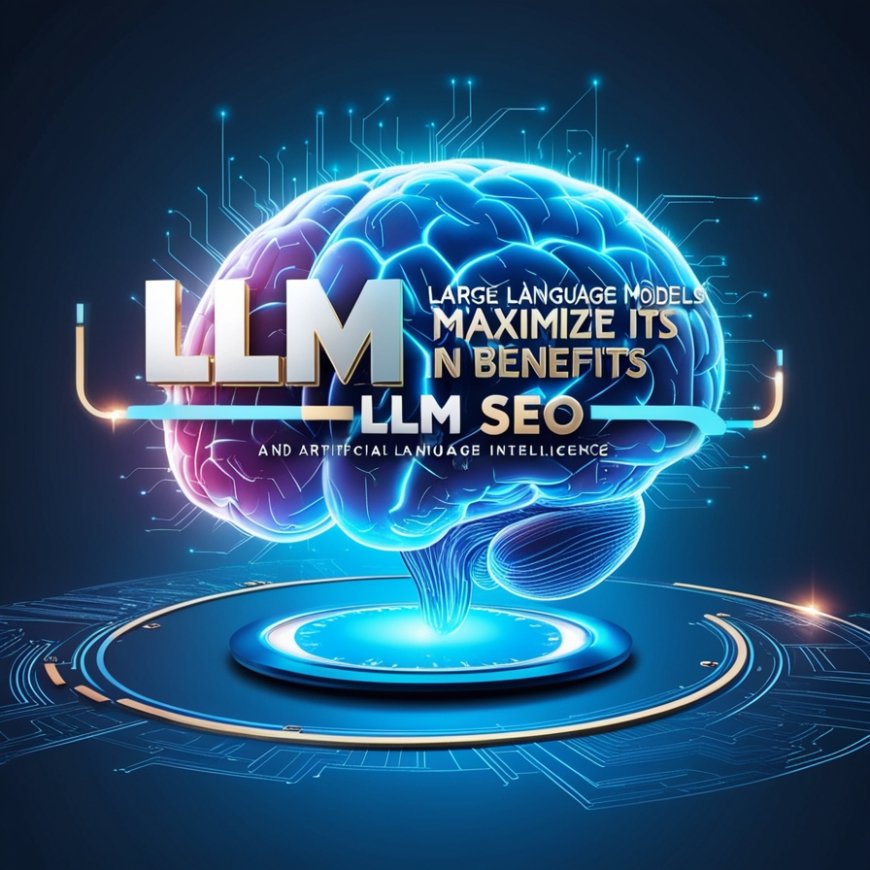What Is LLM SEO and How to Maximize Its Benefits
Learn what LLM SEO is and how to use it effectively to boost your website’s search rankings, traffic, and overall online presence.

The digital landscape constantly evolves, pushing marketers and businesses to adapt quickly. One significant development gaining traction is the use of Large Language Models (LLMs) in Search Engine Optimization (SEO). LLM SEO services represent a new frontier where artificial intelligence models help shape how content ranks and reaches audiences.
This article explains what LLM SEO entails and offers practical advice on how to maximize the advantages it provides.
What Is LLM SEO?
LLM SEO involves leveraging Large Language Modelsadvanced AI systems trained on vast amounts of textto improve SEO strategies. These models, such as OpenAI's GPT series or Google's PaLM, understand natural language in a way that allows them to generate human-like content, analyze search intent, and even assist in keyword research and content planning.
Traditionally, SEO relied on keyword stuffing, backlinks, and metadata. However, search engines now prioritize context, relevance, and user intent more than ever. LLMs excel at processing these elements because they can interpret nuances in language, making SEO more about quality communication than just technical tweaks.
Using LLMs in SEO helps create content that aligns closely with what users seek while adhering to search engines' evolving ranking criteria. They act as powerful tools for content creation, optimization, and performance analysis, making SEO efforts smarter and more efficient.
The Core Components of LLM SEO
To use LLM SEO effectively, it helps to understand its core parts:
1. Content Generation
LLMs can generate content that reads naturally and remains relevant to target keywords. This capability means businesses can produce blog posts, product descriptions, FAQs, and other SEO-friendly content faster. The model's ability to maintain coherence over long texts also helps create detailed articles that hold readers' attention.
2. Search Intent Analysis
Identifying what users truly want when they type a query is essential. LLMs analyze large datasets to determine the intent behind searcheswhether people want to buy, learn, compare, or find local services. Matching content to this intent improves ranking chances.
3. Keyword Research and Suggestion
LLMs can suggest relevant keywords and phrases based on the topic and current search trends. Unlike traditional keyword tools that rely solely on volume or competition, LLMs factor in context, making the suggestions more precise and effective.
4. Content Optimization
After creating content, LLMs help optimize it by recommending changes to improve readability, engagement, and SEO friendliness. These models check keyword placement, sentence structure, and overall flow to enhance the user's experience and satisfy search engines.
5. User Engagement Improvement
Well-crafted content that addresses user needs keeps visitors longer on the site, reducing bounce rates and increasing conversions. LLMs assist in writing compelling calls to action, FAQs, and engaging headings that draw readers deeper into the content.
Benefits of Using LLM SEO
Businesses gain several advantages from integrating LLM SEO into their marketing strategy:
-
Speed and Scale: LLMs can generate large amounts of quality content quickly, helping websites scale their content marketing efforts without sacrificing quality.
-
Better User Alignment: By focusing on search intent, content becomes more aligned with what users want, increasing traffic and engagement.
-
Cost-Effective Production: Automating parts of the content creation and optimization process reduces the need for extensive human resources, saving money.
-
Competitive Edge: Early adopters of LLM SEO often gain an advantage over competitors who rely on outdated SEO techniques.
-
Improved SEO Results: Enhanced content quality and relevance lead to higher rankings, more clicks, and better conversions.
How to Maximize the Benefits of LLM SEO
To make the most of LLM SEO, follow these actionable steps:
1. Define Clear Objectives
Start by setting clear goals. Determine what you want to achieve with SEOwhether increasing organic traffic, boosting sales, or improving brand awareness. Clear objectives help guide how you use LLM tools and what types of content you create.
2. Combine Human Expertise with AI
While LLMs produce excellent content drafts, human oversight ensures accuracy, tone, and brand voice consistency. Review and edit AI-generated content to maintain quality and avoid errors or irrelevant information.
3. Focus on Search Intent
Use LLMs to analyze the type of queries your audience uses and match content accordingly. For example, if users seek "how-to" guides, produce step-by-step articles that provide value and clear answers.
4. Perform Regular Content Audits
Use AI-powered tools to review existing content for gaps, outdated information, or keyword opportunities. Refresh older pages with new insights generated by LLMs to keep your site relevant.
5. Leverage LLMs for Topic Clusters
Create interconnected content pieces around central themes to improve SEO authority. LLMs can help generate related articles, supporting pages, and FAQs that tie into your core topics, enhancing your websites structure and internal linking.
6. Optimize for Featured Snippets
LLMs can help format content to target featured snippets, such as concise answers, bullet points, or tables. Structured content increases the chances of ranking in these prime search result positions.
7. Monitor Performance and Adjust
Track how LLM-assisted content performs using analytics tools. Measure metrics like bounce rate, average session duration, and conversion rates. Use this data to refine future content strategies.
8. Stay Updated on Algorithm Changes
Search engines continuously update ranking criteria. Stay informed about these changes and adapt your LLM SEO tactics accordingly. AI models can help predict trends and adapt content quickly to maintain ranking advantages.
9. Ensure Ethical Use
Maintain transparency about AI-generated content when necessary and avoid misleading users. Combine authenticity with AI efficiency to build trust with your audience.
10. Integrate with Other Marketing Channels
Use LLM SEO content across email campaigns, social media, and paid ads. Consistent messaging across platforms amplifies reach and improves overall marketing impact.
Challenges and Considerations
Although LLM SEO offers many benefits, it comes with challenges:
-
Quality Control: AI models sometimes generate incorrect or irrelevant information. Human editing remains crucial.
-
Originality Issues: Avoid excessive reliance on AI to prevent duplicate or generic content that search engines might penalize.
-
Cost of Advanced Tools: Some LLM platforms require subscriptions or usage fees, which may impact smaller businesses.
-
Technical Skills: Effectively integrating LLMs into SEO workflows may require technical know-how.
Being aware of these challenges allows marketers to address them proactively and extract maximum value from LLM SEO.
Real-World Examples of LLM SEO Success
Several companies have improved their SEO results using LLM technologies:
-
An e-commerce brand used LLM-generated product descriptions tailored to customer questions, boosting conversion rates by 25%.
-
A publishing site automated blog post creation with LLMs and saw organic traffic grow by 40% in six months.
-
A local service provider optimized FAQs with LLMs targeting voice search queries, resulting in a top-three ranking for key search terms.
These examples show how blending AI with traditional SEO tactics can produce tangible business results.
Future Outlook for LLM SEO
The role of LLMs in SEO will only grow as AI models become more sophisticated and search engines rely more on natural language understanding. Expect AI to assist with even more complex SEO tasks such as real-time content personalization, advanced voice search optimization, and predictive content strategies.
Marketers who integrate LLMs thoughtfully and adapt to changes will find themselves ahead in the ever-competitive digital landscape
Final Thought
LLM SEO transforms how businesses approach search optimization by blending advanced AI capabilities with strategic content creation. When used wisely, it accelerates content production, sharpens alignment with user needs, and drives better search rankings. Balancing AIs strengths with human judgment ensures quality and authenticity remain at the forefront. As search engines continue to evolve, embracing LLM SEO offers a powerful way to stay competitive and connect more effectively with your audience.








































